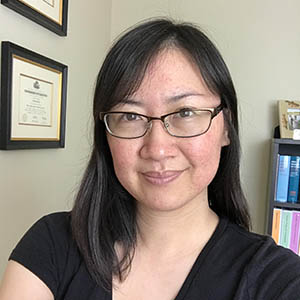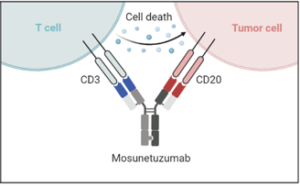
Immunotherapy is broadly defined as any treatment that uses a person’s own immune system to fight cancer by boosting or changing how the immune system works, so it can better find and attack cancer cells. Some immunotherapies are already used for treating chronic lymphocytic leukemia (CLL), including anti-CD20 monoclonal antibodies (rituximab, obinutuzumab) and CAR-T (chimeric antigen receptor-T cell) therapy. We have lots of information on different immunotherapies available here. Immunotherapies are particularly useful because they are generally good at playing with other agents, and when added into a treatment regimen, they often help provide deeper and more durable responses.
At the annual meeting of the American Society of Hematology (ASH) 2020, our own Dr. Brian Koffman interviewed Dr. John Allan, a CLL specialist at Weill Cornell in New York City. They discussed bispecific antibodies, a new class of immunotherapy drugs. Our previous review of bispecific antibodies can be found here.
Takeaways:
- Antibodies are a Y-shaped proteins that normally help the body recognize pathogens such as viruses and bacteria. They bind to unique molecules on the outside of cells known as antigens (ie, CD20 is an antigen expressed on the surface of B cells).
- Bispecific antibodies are a unique type of antibody that can bind both a T cell and a cancer cell at the same time. This redirects the T cell immune response to target the cancer.

This figure shows mosunetuzumab, a bispecific antibody which attaches to CD3 found on T cells and
CD20 found on B cells. Our previous interview with Dr. Stephen Schuster on the results of a phase 1 trial
of mosunetuzumab can be found here.
- As a new class of drug, several bispecific antibodies are being studied in clinical trials for different kinds of lymphomas, though not specifically for CLL yet.
- Most of the bispecific antibodies being tested target B cells through CD19 or CD20.
- The data thus far suggests that bispecific antibodies may be helpful for patients who have resistant disease.
- Bispecific antibodies would be an “off-the-shelf” immunotherapy like rituximab, meaning that there is no waiting/processing time like with CAR-T therapy.
- Bispecific antibodies have serious toxicities, similar to other immunotherapies, including cytokine release syndrome, which is usually seen early on in treatment when close monitoring is needed.
- Current clinical trials do allow enrollment of CLL patients, but because the current therapies for CLL are so effective, there aren’t many patients that need to try a new therapy like bispecific antibodies.
Conclusions:
Bispecific antibodies are an exciting and promising new class of immunotherapy drugs for treating lymphomas and leukemias. Development of these drugs for CLL has lagged somewhat because current therapies like BTK inhibitors, BCL2 inhibitors, and PI3K inhibitors have been so successful in treating CLL patients. However, they will likely prove useful in the future with further study and testing in CLL patients.
Please enjoy this brief interview with Dr. Allan from the virtual ASH meeting which was held December 2020.
Take care of yourself first.
Ann Liu, PhD
Ann Liu is a medical writer who lives in southern California. In a former life as a scientist, she conducted research on diet and chronic diseases such as cancer and obesity. She enjoys learning new things about science and health, and she also loves beagles and trips to the beach.
Originally published in The CLL Society Tribune Q2 2021.

















